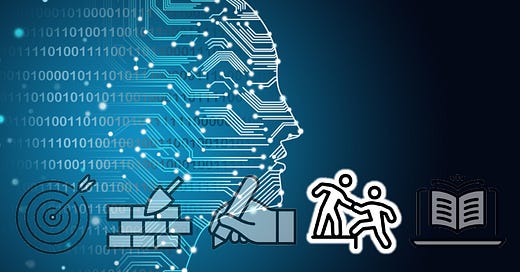25 for 25: AI and book writing
AI is great for a lot of things! Writing a book isn't one of them.
This essay is part of my 25 for 25 book writing series. The lessons in this series are meant to simplify the book writing and production journey. You can find a guide with links to the entire series here.
With the advent of large language model-based chatbots like ChatGPT, it seems like everyone thinks they can cheaply, easily, and quickly churn out a book in a day, post it on Amazon, and present themselves as a thought leader.
But there are so many different reasons why that's a bad idea.
AI is great for a lot of things! Outlining is one of them. During the outlining or ideation process, I urge you to use ChatGPT to come up with talking points and ideas to use within your book.
You can type in quick prompts and get immediate results.
Suggestions for key topics about economics, an outline for a book on leadership, it’s all ready for you to use it.
Garbage in, garbage out
That’s not to say that the technology is perfect, or that you can just pass off ChatGPT text and use it as is within your book. AI requires thought and input from you to get the most out of it.
Garbage in, garbage out.
Good things in, good things out.
Drawbacks to AI-generated text
ChatGPT is also limiting. There really aren't friction points or controversy with AI—everything's easy and clean.
And most notably, the results are missing a key element: you. AI chatbots are taking ideas from the collective knowledge of the world, and of the internet, and turning them into digestible chunks that may or may not be accurate.
My experience “writing” a book with ChatGPT
When ChatGPT first launched, I thought it would be really interesting to churn out quick AI-written books on each of the U.S. presidents.
Easy, right?
I started with James Buchanan, since he was from my hometown of Lancaster, Pennsylvania. And I spent an afternoon watching ChatGPT write “my” book about the 15th president.
It was a nightmare. The facts and information were largely not accurate and easy to refute from quick research. The writing was clunky and stilted.
Since that time, there have been lawsuits regarding ChatGPT and safeguards set in place with some of the leading publishing outfits.
Simply put, it’s becoming harder to copyright books that have been written with AI. And those books shouldn’t be copyrighted—the text isn’t original.
ChatGPT is also missing your unique story, which is the whole point of the book!
This is your chance to tell your story, whether that’s an ancestry book, or a leadership book, or a self-help book … no matter the topic, whether implied or explicit, there needs to be some element of you within the text.
Keeping the you in your book
If there's no you within the book, why would anyone want to read it and promote it? How likely are others going to be to promote it? And to tell others about it? And leave a five-star review?
And if you're just relying on the collective information of the world to fill your book, what more is there to say? In essence, everything in your book has already been written before, the words are just written in a different way.
If you’re trying to be an authority on a certain topic, if you're trying to sound smart or generate leads for your business, or establish your authority, using computer text isn’t the way to go.
Helpful AI tools
While I discourage using ChatGPT to write your draft, there are other AI tools that can be helpful to you, such as Grammarly, the cloud-based writing assistant.
Grammarly can help you clean and edit your text for your specific target audience.
NotebookLM is also helpful in analyzing documents.
New AI tools seem to be coming out every month or two—but consider how these tools can assist you, instead of doing the writing for you. There is no substitute for quality and no magic program to writing a great book.
Watch this!
I cover AI and book writing in this video.




